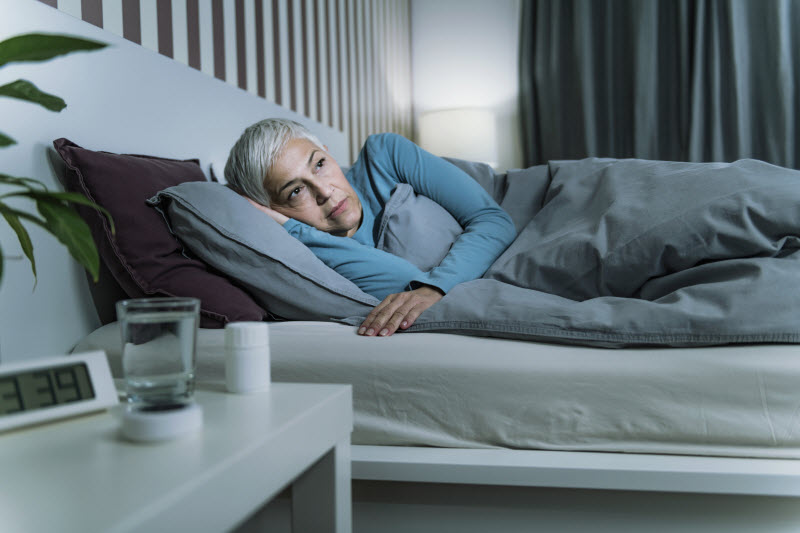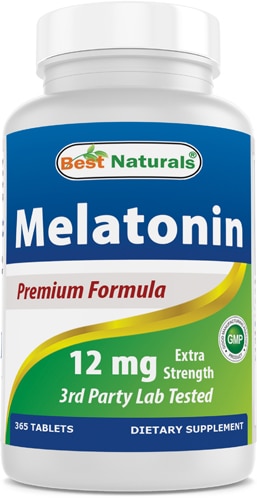[vc_row][vc_column][vc_column_text]If you’re a woman in your late 40s or early 50s and you’ve been having more trouble sleeping than you used to, you might be wondering whether hormonal changes related to
menopause are involved. Here’s what to know about how menopause affects sleep and what you can do about it.

What is menopause?
Menopause is the name for the moment at which women have gone twelve months without menstruating. The time leading up to then is called the menopausal transition or
perimenopause. According to the National Institute of Healthy Aging, that
transitional period can last seven to fourteen years, and may include a number of symptoms commonly referred to as “menopausal.”
During those years, hormone levels fluctuate, affecting everything from mood to weight to sleep quality.
Menopausal symptoms can vary from one individual to another, and many women experience only mild symptoms of menopause. Others may get intense hot flashes, gain weight, and find themselves more irritable than normal.
Research suggests that about
half of all women experience sleep disturbances during the menopausal transition.
What causes problems menopause sleep problems?
Those changing hormones can have a profound impact on sleep. According to
Dr. Himali Maniar Patel, a gynecologist at Nisha Women’s Hospital, “Sleep disturbances can be directly linked to hormonal changes, including decreased levels of estrogen and progesterone, which play a critical role in regulating sleep.”
Lower progesterone levels affect your levels of tryptophan, an amino acid used to make the sleep-regulating hormone melatonin. Falling levels of estrogen can make waking in the night more likely while also affecting the body’s ability to
regulate temperature.
Hot flashes, intense feelings of being overheated lasting from thirty seconds to ten minutes, can happen during sleep, causing you to wake up. These “night sweats” are notorious for disrupting sleep, sometimes causing such profuse sweating that clothing and sheets can become wet and uncomfortable.
Lower levels of estrogen may also cause changes in levels of
thyroid hormones, though the relationship between these hormones is not yet well understood.
Melatonin production also drops off with age, making it more challenging to get a restful night sleep.
As anyone who’s ever had a terrible night’s sleep knows, without the rest our brains and bodies need, we become irritable, forgetful, depressed and accident-prone, among many other impacts of
insufficient sleep.
Here’s
how to sleep better during the transition to menopause.
Better sleep during menopause
Many of the healthy habits that support overall wellness throughout your lifetime also help to moderate the symptoms of menopause and make it more likely they won’t interfere with sleep.
1. Emphasize activity
Consistent vigorous exercise has been shown to help people regulate body heat, and emerging research suggests it might also
lessen the incidence of uncomfortable hot flashes. Maintaining a
healthy weight has also been linked to fewer reported hot flashes.
Some research has found that
yoga can help with menopausal symptoms and improve sleep. Other studies are exploring the
connection between mindfulness practice and reduced menopausal symptoms.
Sleep therapist
Jacob Smith suggests preventing sleep problems by “creating a calming routine before bed, such as reading a book, taking a
warm bath, or practicing relaxation techniques like deep breathing or meditation.” He also advises “maintaining a consistent sleep schedule to regulate your body's internal clock” and “keeping your bedroom cool, dark and quiet to promote better sleep.”
Additional strategies that promote better sleep can help head off sleepless nights:
- Try to get outside in the morning. Daylight is a powerful signal to our internal clocks and early light exposure can help regulate circadian rhythm.
- Power down. Darkness tells our brains that it’s time for sleep. Dim the lights and unplug from electronics at least 30 minutes before bed.
- Try not to use your bed for work or watching television. You want to associate your bed with sleep, not stress or entertainment.
- Don’t consume caffeine within 8 hours of bedtime. (Try a tasty )
- Avoid alcohol, which may make you feel sleepy but has actually reduces sleep quality.
Making sure your bedroom is cool and the covers aren’t too heavy can help you avoid overheating and encourage better sleep as well.
3. Stay hydrated
Drinking enough water can help your body regulate temperature better. Cooling foods like watermelon and cucumber can also help. Keep a cup of ice water by your bed to cool you off if you get hot during the night.
4. Get plenty of nutrients that support sleep
Top among sleep-promoting nutrients is
magnesium, which is involved in over 300 processes in the body, including the production of the sleep hormone melatonin and the regulation of our circadian rhythm.
Certain nutrients are thought to be especially helpful for hormone levels, particularly
B vitamins and
vitamin E. Try to incorporate foods like
flax,
pumpkin seeds,
chickpeas,
almonds and
sunflower seeds into your diet, along with cruciferous vegetables, which additionally are natural sources of GABA, a neurotransmitter that can encourage quality sleep.
Dr. Patel adds, “Intake of omega-3 fatty acids found in fatty fish may also improve sleep.” Emphasize a whole-foods diet that includes sources of omega-3s like salmon,
walnuts and
chia, or consider a
fish oil supplement. Vegans can find
plant-based omega-3 supplements.
†
Some research indicates that g
ut health plays a role in the body’s synthesis of sleep-promoting compounds, so emphasizing foods that
improve the health of your gut microbiome may also help to support better sleep.
Supplements that support gut health like
turmeric and
probiotics may offer additional support not only for sleep, but also for energy and mood.
†
One study using data from over fifty thousand women in the Women’s Health Initiative study looking at the relation between diet and sleep disturbances in postmenopausal women found that
women with a high GI diet were more likely to develop insomnia during menopause than those with a low GI diet.
5. Approach triggers with caution
Caffeine, spicy foods and alcohol not only disrupt sound sleep, they also may make annoying hot flashes more likely. Try to avoid consuming these foods later in the day so they don’t interfere with your sleep.
6. Consider sleep-promoting supplements
If you’ve tried lifestyle changes and still struggle with sleep, there are a number of
sleep-supporting supplements to consider exploring.
Vitamin D: Research suggests that
vitamin D deficiency can negatively impact sleep. During the warmer months, most people can
get vitamin D from the sun, but during much of the year those in northern latitudes can’t and need to eat plenty of
foods high in vitamin D or take a supplement.
†
Hops: Hops may help sleep in menopause in two ways. A sedative herb, it’s used broadly for promoting sleep, and research has shown that
hops can also ease symptoms associated with menopause.
†
Magnolia bark: Compounds in magnolia bark extract help promote healthy stress hormones and support production of GABA.
†
Dr. Patel notes that “supplements like melatonin and valerian root, under medical advice, could also support sleep, although their effectiveness may vary.”
†
If you’d like to sleep better during menopause and beyond, try out some of these shifts in lifestyle and diet to see what helps you get a good night’s rest.
†These statements have not been approved by the Food and Drug Administration. These products are not intended to diagnose, treat, cure or prevent disease.
[/vc_column_text][/vc_column][/vc_row][vc_row][vc_column][vc_text_separator title="Featured Products" border_width="2"][vc_row_inner equal_height="yes" content_placement="middle" gap="35"][vc_column_inner width="1/3"][vc_single_image image="173834" img_size="full" alignment="center" onclick="custom_link" img_link_target="_blank" css=".vc_custom_1711215371432{padding-right: 7% !important;padding-left: 7% !important;}" link="https://www.vitacost.com/country-life-menopause-rescue"][/vc_column_inner][vc_column_inner width="1/3"][vc_single_image image="173835" img_size="full" alignment="center" onclick="custom_link" img_link_target="_blank" css=".vc_custom_1711215423207{padding-right: 7% !important;padding-left: 7% !important;}" link="https://www.vitacost.com/nouri-menopause-health-probiotic-and-omega"][/vc_column_inner][vc_column_inner width="1/3"][vc_single_image image="173836" img_size="full" alignment="center" onclick="custom_link" img_link_target="_blank" css=".vc_custom_1711215445897{padding-right: 7% !important;padding-left: 7% !important;}" link="https://www.vitacost.com/gaia-herbs-women-nighttime-comfort"][/vc_column_inner][/vc_row_inner][/vc_column][/vc_row]




